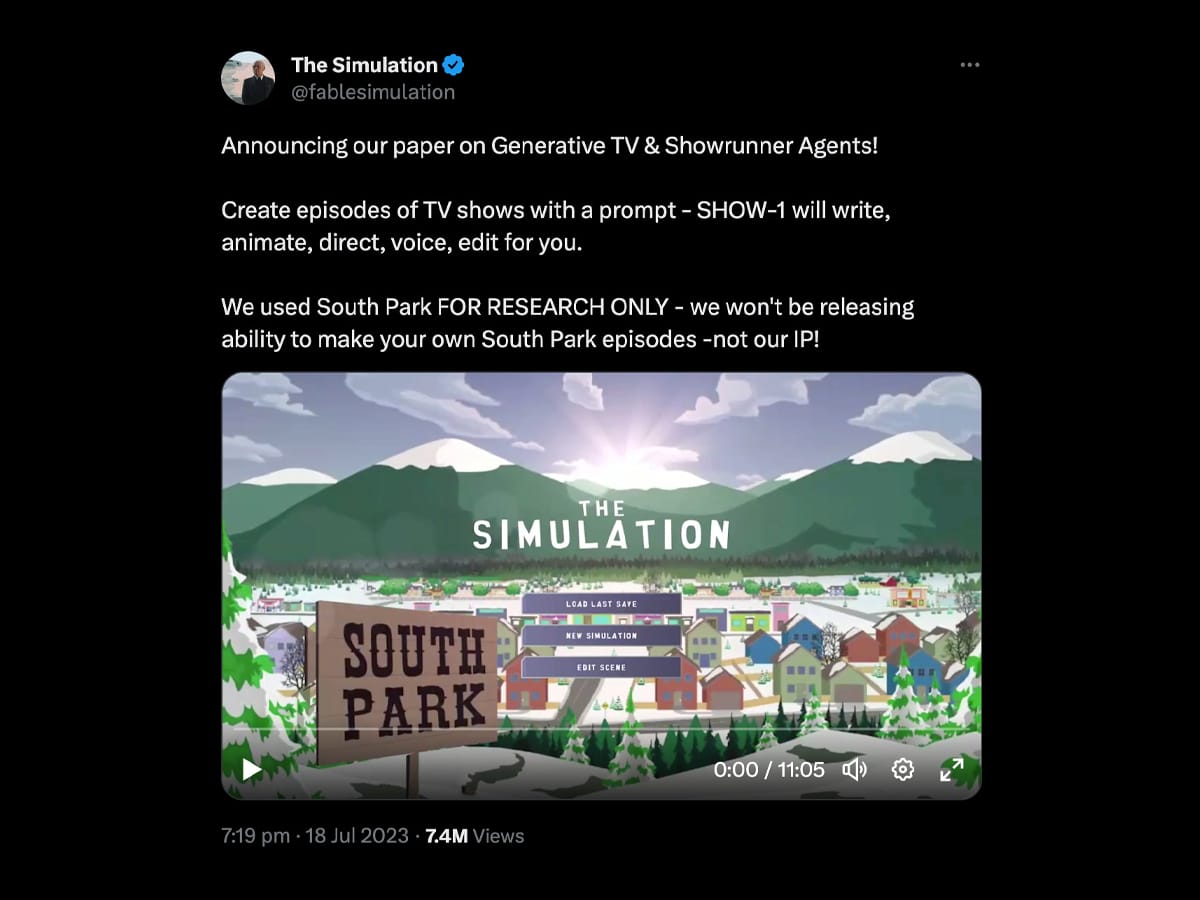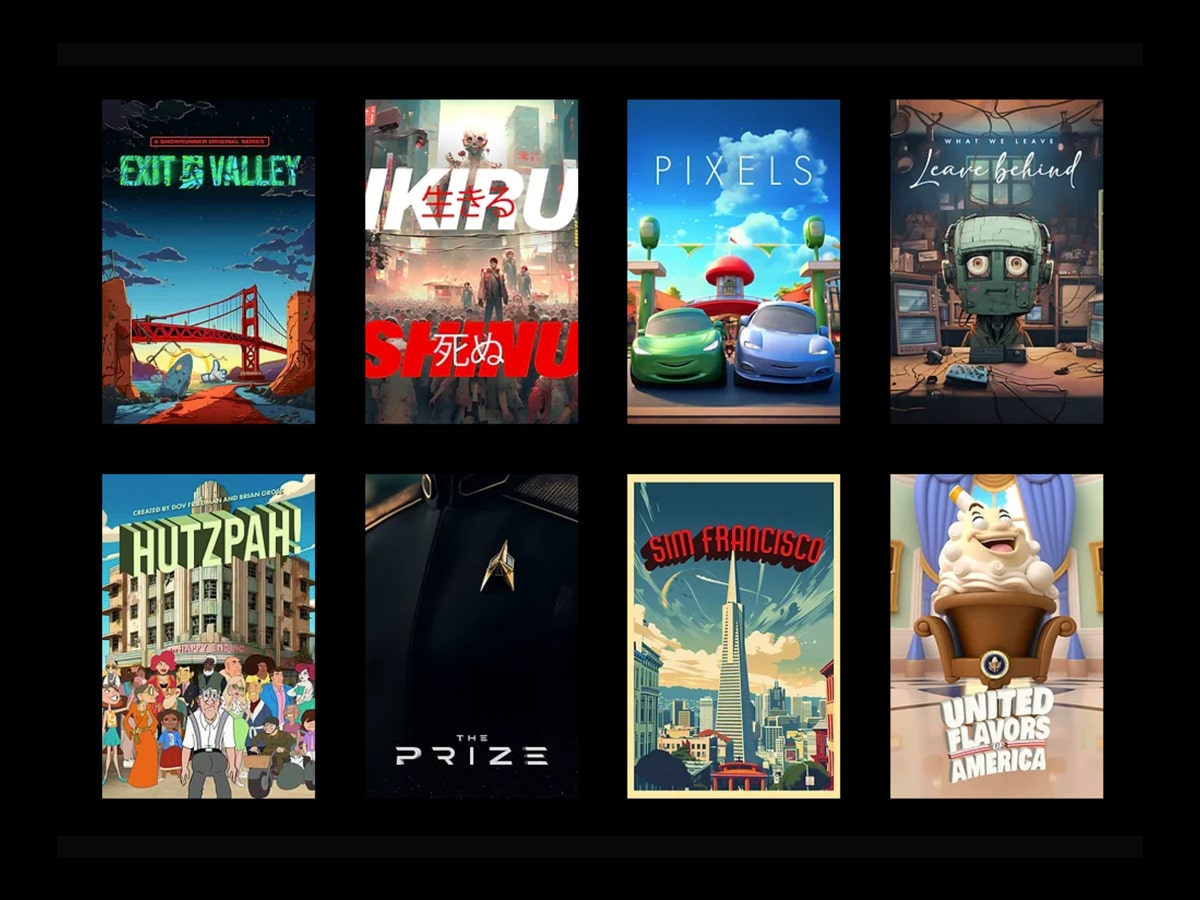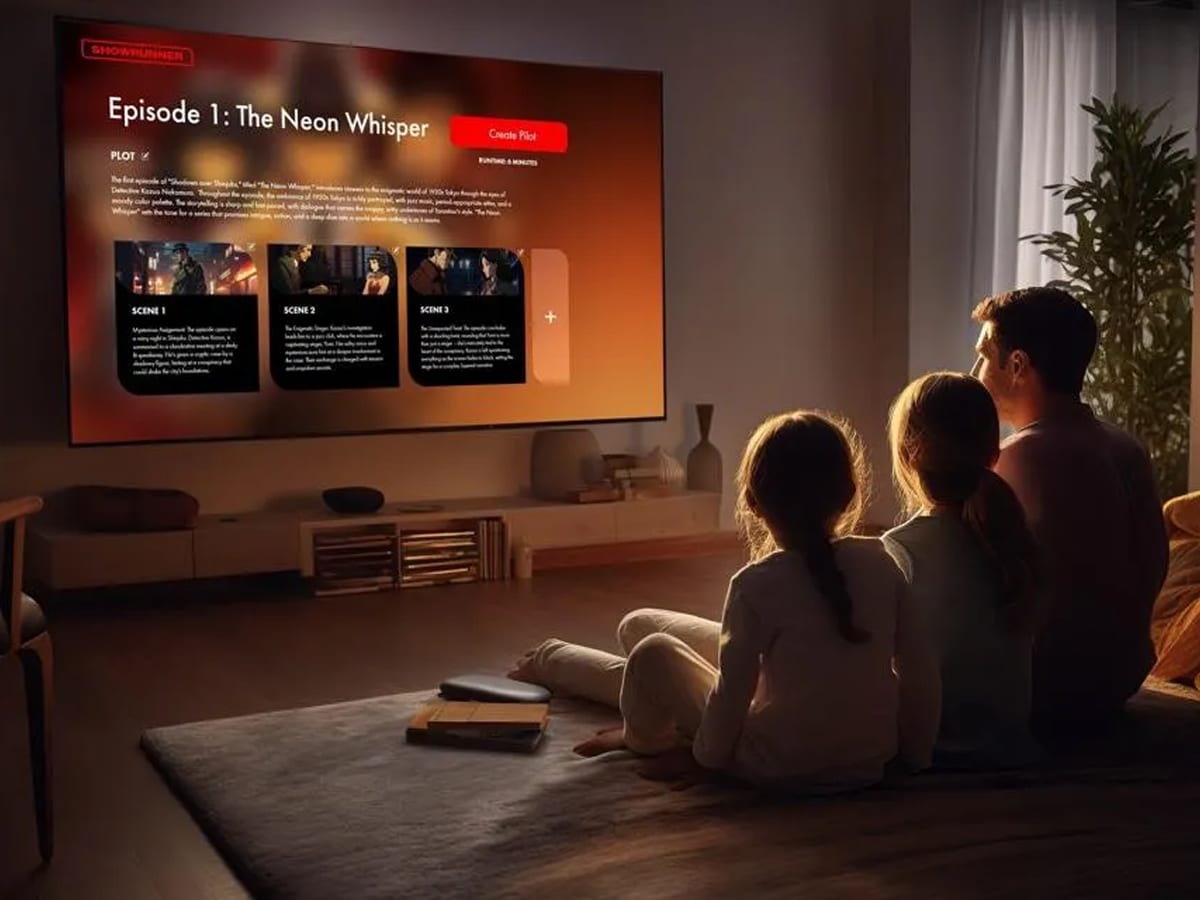
Published:
Readtime: 7 min
Every product is carefully selected by our editors and experts. If you buy from a link, we may earn a commission. Learn more. For more information on how we test products, click here.
Just a year or so ago, generative AI was a relatively new concept that most of us were struggling to grasp. Now, it’s everywhere – creating your playlists, formulating your favourite fizzy soft drink, and even making its mark on Hollywood. Building on the whole generative AI hype, a San Francisco-based company named The Simulation (earlier called Fable Studio) recently announced a new platform called Showrunner, aiming to disrupt the whole status quo of how we watch TV by putting the reins in your hands to create your own show.
While creating a high-quality TV show involves countless moving parts and bringing such a dream to life is no easy feat, Fable Studio’s new text-to-episode system, Showrunner AI, hopes to simplify this process. As the name might suggest, Showrunner AI enables you to create your own TV series episode by episode through text commands. The platform handles writing, voice acting, and animation, potentially even incorporating music and sound effects.
RELATED: OpenAI Pauses Release of Groundbreaking Voice Cloning Tool Because It’s Too Good.
What is Showrunner?
Fable Studio’s Showrunner is billed as the world’s first user-driven, AI-generated streaming platform. It uses a text-to-episode format, where users enter a 10- to 15-word prompt. With this prompt, the platform can generate scenes and episodes ranging from two to 16 minutes. The showrunner takes care of everything, from dialogue and voice acting to editing and diverse camera angles, and even ensures consistent character development and plot progression.
“It’s the Netflix of AI,” founder and CEO Edward Saatchi told Forbes. “Watch an episode, or make an episode.” Currently, all the shows on the platform are animated and users can watch AI-generated series or create their own content using prompts in various styles, from anime to Pixar-style to South Park-inspired cutouts. Founder and CEO Saatchi hinted that things will get even more interactive in the future, with the possibility of scene-by-scene prompt control. “One prompt with 15 words can be enough for AI to generate a whole episode of 10 to 20 minutes,” Saatchi said in a GamesBeat interview. “But we’re finding that people prefer to, like, do a prompt per scene.”

How Does Showrunner Work?
Last year, the company released a South Park episode that showcased its text-to-episode AI tech, and while the episode’s humour might not have landed perfectly, it definitely showed a significant leap forward. Building on this success, Fable Studio has now launched the Showrunner platform, which takes advantage of the SHOW-1 model and AI agents that can handle the entire production process for AI-powered TV shows, from writing to animation.
The research paper, which you can read here, details how the SHOW-1 model and AI agents use large language models (LLMs), custom state-of-the-art diffusion models and multi-agent simulation for contextualisation, story progression, and behavioural control. “Powerful LLMs such as GPT-4 were trained on a large corpus of TV show data which lets us believe that with the right guidance users will be able to rewrite entire seasons,” says the research paper.

Showrunner leverages multi-agent simulations to create scenes and image assets that are more coherent and consistent with the IP’s story world. This approach utilises data points like a character’s history, goals, emotions, simulated events, and locations. As the research paper explains, “An IP-based simulation provides a clear, well-known context to the user, which allows them to judge the generated story more easily. Moreover, by allowing them to exert behavioural control over agents, observe their actions and engage in interactive conversations, the user’s expectations and intentions are formed, which we then funnel into a simple prompt to kick off the generation process.”
Saatchi said the system is trained on “publicly available data.” However, when questioned about AI companies using copyrighted materials, he told THR, “What matters to me is whether the output is original” and that the “content is what will decide whether the tech is worthwhile.”
While talking to Forbes Showrunner co-creator Jacob Madden said, “It’s become consensus to say that AI is ‘just’ a tool in the toolbox, merely another stage of VFX technology—we believe it’s a much more radical disruption, and that Hollywood will make two-way entertainment: audiences watching a season of a show, loving it and then making new episodes with a few words, audiences putting themselves in shows. The platform allows showrunners to experiment with their stories in real-time, constantly iterating and refining their vision. Showrunner redefines what a TV show can be in that it lets a viewer watch a show, love it, and instantly become a creator of the next episode.”

What All TV Shows Can I Watch on Showrunner?
As part of the launch, Showrunner announced 10 animated shows spanning various genres and styles, predominantly made using AI tools (excluding music and some transitions). While you can’t create your own TV shows just yet, interested users can join the Showrunner waitlist by visiting the official Showrunner website and entering their email ID under the ‘Join Showrunner Waitlist for Early Access’ section. The company also showed off teasers for many of the announced shows.
Currently, only ‘Exit Valley‘ is available for all alpha users, while the rest are in development by creators. The TV shows lineup include:
- Exit Valley – With the first episode now available, ‘Exit Valley‘ is billed as a “vicious, crazy satire of tech barons, startup entrepreneurs, and researchers seeking their exits—whether financial, bodily (escape death!), or psychotropic!” Think of it as a Silicon Valley parody in the animation style and comedic vein of South Park.
- What We Leave Behind – An anime family drama about two orphans navigating life in Sim Francisco.
- Ikiru Shinu – A dark, gripping horror anime that follows the survivors of a global catastrophe as they attempt to rebuild society.
- Sim Francisco – An anthology series exploring the lives of various characters living in the shared universe of “Sim Francisco.”
- Pixels – A family comedy featuring AI-enabled devices living together in Sim Francisco.
- United Flavors of America – A witty political satire cartoon set in the United States of 2024.
- Hutzpa! – The TV show follows Bernie, a grumpy widower, who moves into a rundown senior home, only to discover that the quirky residents might teach him a thing or two about life.
- The Prize – An adventurous tale set in space, focusing on spacefaring explorers who encounter alien life.
- Thistle Gulch – A Western series filled with mystery and dark secrets.
- Shadows over Shinjuku– An anime detective noir drama set in the 1930s.

How Will AI-generated TV Shows Like Those Created by Showrunner Change the Way We Consume Television?
To make the long story short AI tools like Showrunner or OpenAI’s Sora aren’t revolutionizing the entertainment industry just yet, but they do offer a fascinating glimpse into the future. While these can generate content on-demand based on a few lines of prompt, for now, they’re nothing more than impressive demos rather than industry changers. One of the main issues with AI is that it still has a hard time matching the creativity of humans, mainly because it is trained on existing ideas and datasets.
These tools are great at copying existing styles and data, but they struggle to be original and unique. Right now, AI just can’t match the human ability to bring fresh ideas and emotional depth to creative projects because it can’t draw on personal experiences and artistic understanding, which are crucial in creating really impactful stories.
Furthermore, Showrunner excels at one-off episodes, not the sprawling multi-season arcs that define great TV. However, despite these drawbacks, AI could be a valuable tool in brainstorming or generating initial story ideas. It will be interesting to see how these tools mature and potentially transform the creative landscape. For now, though, they remain promising, albeit somewhat flashy, AI tricks.





























Comments
We love hearing from you. or to leave a comment.